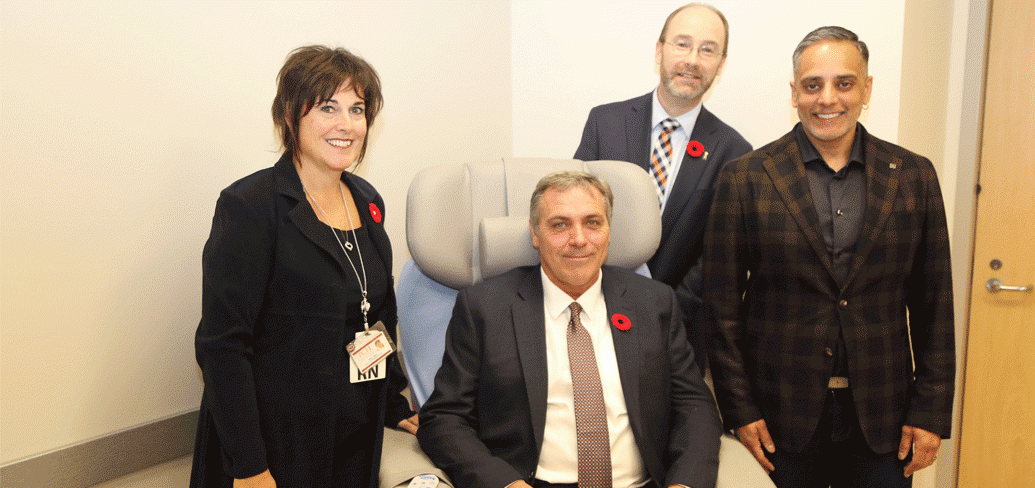New kidney care clinic opens

Islanders with chronic kidney disease will benefit from better access to kidney care through the new PEI Renal Clinic.
The $2.1 million provincial renal clinic is designed to support growth within provincial renal services such as peritoneal dialysis and post-kidney transplant care, as well as better support Islanders with early onset chronic kidney disease. There are more than 1,300 Islanders who rely on life-sustaining and life-saving renal care coordinated through the provincial clinic.
“Our government is taking major steps forward to improve our renal program, so that Islanders and their families have the best access to the most appropriate life-saving care,” said Health and Wellness Minister Robert Mitchell. “The new Provincial Renal Clinic will help our staff to be better equipped and have more capacity to work with patients and their loved ones.”
The new 6,000 square-foot clinic features eight patient care/exam rooms, a patient training room, a family conference room, a clinical work space, meeting rooms, offices for staff, a dedicated reception area, and storage for renal equipment.
Until now, the provincial renal clinic operated out of a shared clinic space with just four patient care rooms in the QEH’s Ambulatory Care Centre.
“Today represents a significant milestone for renal care in our province,” said Dr. Derek Chaudhary, nephrologist and Provincial Renal Program medical director. “This modern and spacious clinic will allow our team to see more patients every day and provide them with the life-saving supports they need to manage their chronic kidney disease. The better we can help manage their kidney disease, the better the outcomes for our patients. In some cases, we may even be able to delay the need for treatments such as dialysis.”
Matthew MacFarlane, past president of the Atlantic Branch of the Kidney Foundation of Canada, and kidney disease patient himself, shares the excitement over the opening of the new clinic. “The number of people on PEI living with kidney disease is growing rapidly, and patients at different stages of the disease have very different health care needs.”
“This new clinic will better serve the diverse needs of this expanding group, and improve the quality of life for individual patients. As the organization responsible for kidney patient advocacy, the Kidney Foundation is extremely pleased to see the enhanced services now available for kidney patients on PEI,” MacFarlane said.
For more information about the Provincial Renal Program and its services, visit healthpei.ca/dialysis.
Media contact:
Amanda Hamel
Senior Communications Officer
Health PEI
(902) 368-6135
ajhamel@gov.pe.ca
Backgrounder:
About chronic kidney disease:
Chronic kidney disease, also called chronic kidney failure, is the gradual loss of kidney function. Chronic kidney disease occurs when a disease or condition impairs kidney function, causing kidney damage to worsen over several months or years.
Risk factors for chronic kidney disease include diabetes (Type 1 or 2), high blood pressure, cardiovascular disease, smoking, obesity, family history, abnormal kidney structure and age to name a few.
About the Provincial Renal Program and Renal Clinic:
The various renal services coordinated through the PEI Renal Clinic include:
- peritoneal dialysis program (26 patients),
- hemodialysis program (103 patients), and
- post-kidney transplant program (105 patients).
An additional 9 Islanders on a “close watch” list for dialysis treatment are being closely followed through the provincial renal clinic.
The provincial renal clinic also provides support and disease management to more than one thousand Islanders living with early onset chronic kidney disease that are not yet in need of dialysis treatment.
Provincial renal clinic staff includes two nephrologists, a full-time nurse practitioner, a pharmacist, registered nurses, a social workers, and dietitians who work collaboratively to support patients in the various renal programs, as well as those living with early onset chronic kidney disease.
History of Provincial Renal Program Expansion:
A series of provincial government investments have been made since 2011 to modernize and expand the Provincial Renal Program, including:
- renovating and upgrading the Alberton Hemodialysis Unit;
- adding an afternoon shift at the Summerside Hemodialysis Unit to address the growing need for service in this region, increasing capacity from 30 to 36 patients;
- adding an evening shift at the Charlottetown Hemodialysis Unit to address the growing need for service in this region, increasing capacity from 58 to 67 patients;
- establishing peritoneal dialysis and post-kidney transplant programs;
- purchasing new hemodialysis machines with more advanced treatment options;
- hiring dedicated staff to the Provincial Renal Program to support existing and new programs, including a pharmacist, registered nurses, a social worker, and dietitian;
- hiring a full-time nurse practitioner to the Provincial Renal Program to work in collaboration with nephrologists, assisting with patient triage and more timely access to renal clinic care;
- relocating the Provincial Renal Program offices to the Queen Elizabeth Hospital;
- renovating and upgrading the Souris Hemodialysis Unit, increasing treatment capacity from 10 to 12 patients; and,
- building new new hemodialysis units in Charlottetown at the Queen Elizabeth Hospital and in Summerside at Prince County Hospital.
